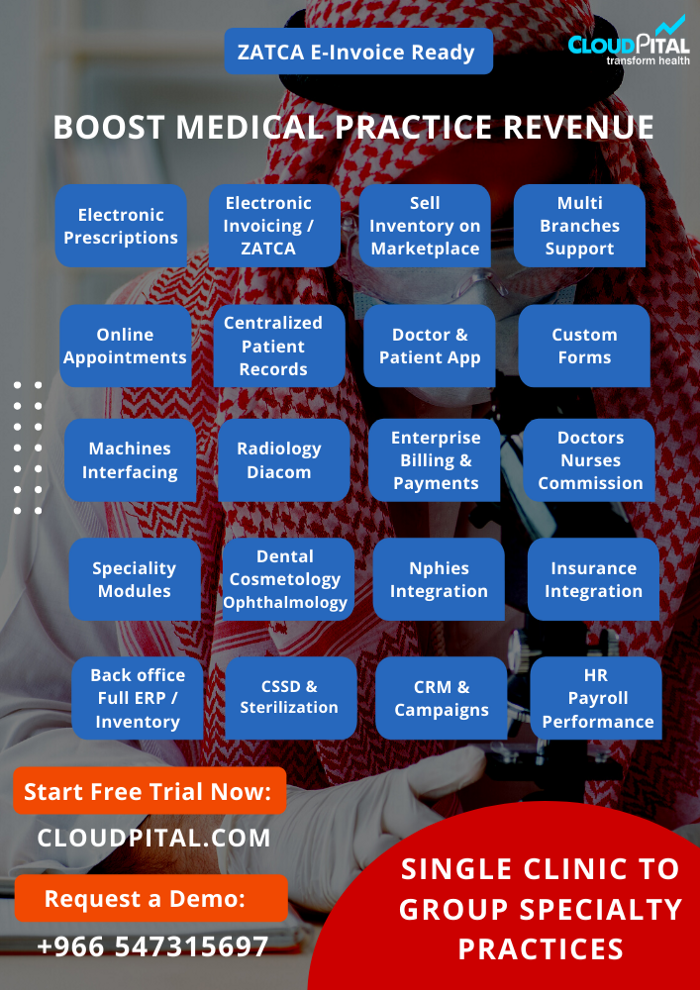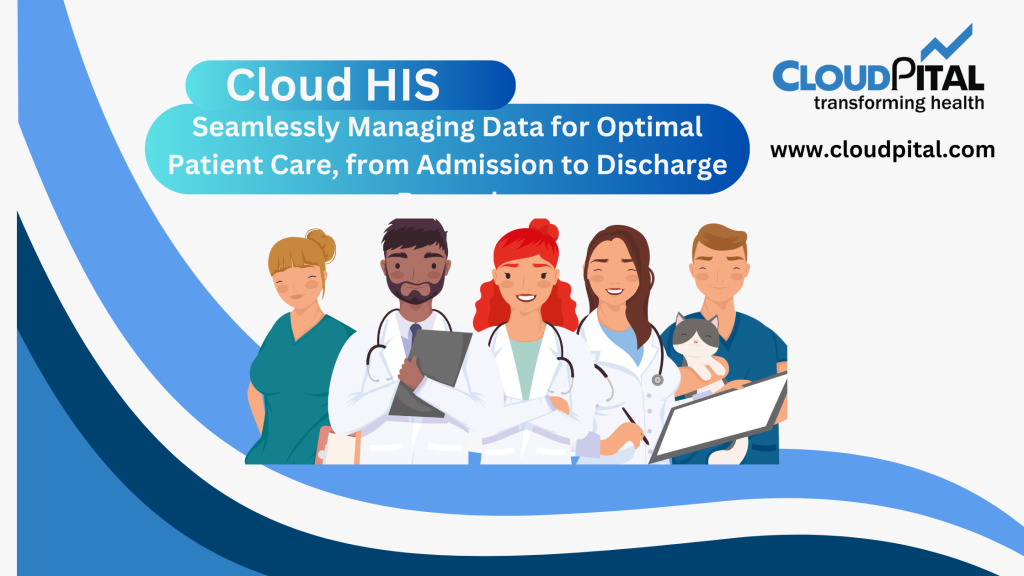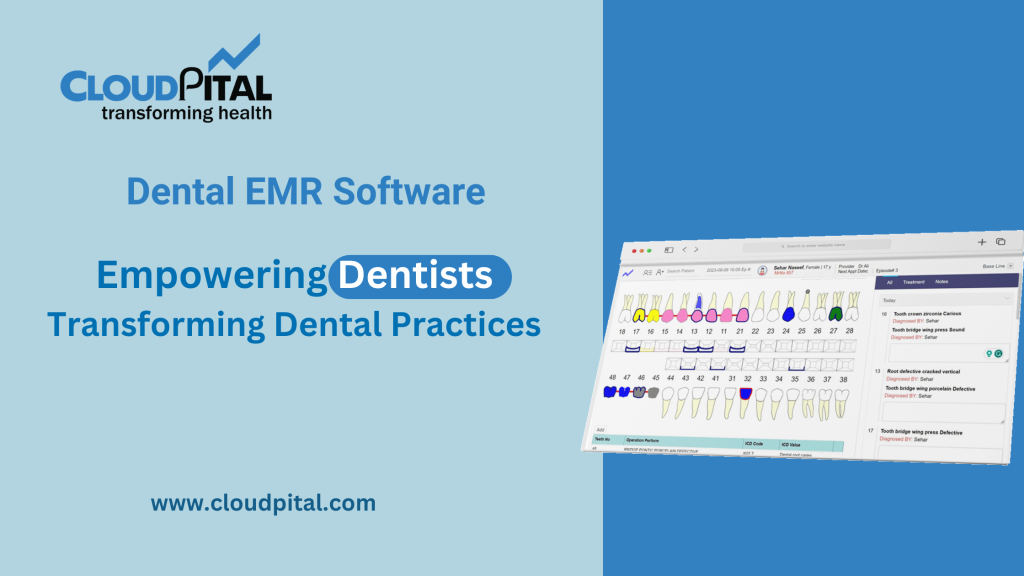Bilytica # 1 is one of the top Medical Solutions the new game-changer in most industries, including health care. Medical practices used to rely on the on-premises server for storing patient records and imaging data and other sensitive information. However, as more health care data are collected, on-site systems tend to be expensive, inefficient, and hard to maintain.
Click to Start Whatsapp Chatbot with Sales
Mobile: +966547315697
Email: sales@bilytica.com
Cloudpital # 1 Medical Solutions

Cloud-based Medical Solutions offer an alternative that is more flexible and scalable. Healthcare providers can access tools and shared information securely by shifting data and applications to the cloud with minimal burden on managing or maintaining physical infrastructure to ultimately improve patient care.
Key areas in which cloud technology is being implemented include electronic health records (EHRs), patient management systems, diagnostic tools, and telemedicine platforms. Cloud technology can be used to streamline operations, enhance accessibility, and reduce overhead costs, making it an indispensable part of modern healthcare systems.
Security and Compliance in Cloud-Based Medical Solutions
The biggest concern for healthcare providers when implementing cloud technology is ensuring the security and privacy of sensitive patient information. Data breaches are now common in all industries, so ensuring health data is secure in the cloud has never been more important.
Nonetheless, these solutions are built with state-of-the-art security safeguards designed to protect patient data as though your health provider’s vault. It strictly complies with any existing regulation in the United States-Health Insurance Portability and Accountability Act (HIPAA), or in Europe-General Data Protection Regulation (GDPR) for any cloud-based health systems.
Some of the prime security features that have been put into cloud medical solutions:
Data Encryption: Data is encrypted both in transit and at rest, so unauthorized individuals cannot access patient information.
Multi-factor Authentication (MFA): MFA ensures that only authorized personnel can access sensitive medical data, reducing the risk of unauthorized access.
Regular Audits and Monitoring: Cloud services undergo regular security audits, and continuous monitoring ensures that any vulnerabilities are quickly detected and addressed.
Redundancy and Disaster Recovery: Cloud platforms usually offer redundancy and disaster recovery. This means that data is always backed up, and in case of hardware failure or a natural disaster, it is available for access.
These security features make cloud-based solutions not only practical for healthcare organizations but also highly secure, ensuring patient confidentiality and regulatory compliance.
Cloud-based Medical Tools Streamline Operations
Cloud technology’s ability to streamline operations is one of the key reasons healthcare providers are shifting toward cloud-based systems. In a typical healthcare setting, time is a critical factor in delivering patient care. Cloud solutions simplify administrative tasks, improve communication between departments, and enable real-time updates to patient records, allowing providers to focus on what matters most—delivering quality care.
Here’s how cloud-based solutions are enhancing operational efficiency:
Electronic Health Records (EHRs): Paper-based, traditional patient records are bulky and full of errors as well as delays. Through cloud-based EHRs, patients’ records will be captured, retrieved, and updated in real time by a healthcare provider. The up-to-date information will therefore be easily accessible to all team members who care for the patient, avoiding mistakes in treatment and ensuring successful outcomes in patient care.
Medical Imaging and Diagnostics: Cloud platforms allow medical images, including X-rays, MRIs, and CT scans, to be safely stored and shared between healthcare professionals. Radiologists and specialists can access these images from anywhere in the world, collaborate on diagnoses, and ensure faster, more accurate decision-making.
Patient Management Systems: Cloud solutions allow for efficient patient scheduling, reminders, and follow-ups. They help eliminate scheduling errors, reduce no-shows, and improve overall patient flow in healthcare facilities.
Telemedicine Integration: Cloud solutions support Medical Solutions platforms, allowing health care providers to deliver virtual consultations to patients. It is particularly useful in areas where access to in-person care may be limited.
By automating routine tasks, reducing paperwork, and enhancing collaboration, cloud-based medical solutions allow healthcare organizations to streamline their workflow and enhance service delivery.

Collaboration and Accessibility: Cloud Brings Down Barriers
One of the most significant advantages of cloud-based medical solutions is the fostering of collaboration among ERP professionals. With cloud-based solutions, medical professionals no longer need to be in the same physical location to collaborate on patient care. Cloud platforms allow seamless communication and data-sharing between departments, clinics, and even different healthcare facilities.
Interdisciplinary Collaboration: In cloud-based systems, doctors and nurses, specialists and allied health professionals, can easily collaborate in real time. A cardiologist in a city can consult with another surgeon in a different city regarding treatment plans for a patient. This approach brings out holistic and rounded care to patients.
Access Anywhere, Anytime: Cloud-based solutions make medical data accessible from virtually any device that has an internet connection. Healthcare providers can access patients’ records, diagnostic results, and treatment plans with security on their mobile phones, tablets, or laptops and will be able to make swift decisions from anywhere in the world.
Cloud-based solutions can also enable use of tools for remote monitoring of a patient. With wearables or home health devices, they collect data and transmit it into the cloud to be read and monitored later. Therefore, with real-time monitoring of a patient’s conditions, appropriate interventions are received in timely manners.
This high level of accessibility and collaboration enhances healthcare delivery, reduces delays in care, and ensures that patients receive the best possible treatment no matter where they are located.
Cost Efficiency: Reducing Overhead with Cloud Solutions
Healthcare facilities are mostly experiencing rising operational costs, which leads to budget constraints. Traditional IT infrastructure has tremendous upfront costs that include server purchases, hardware maintenance, and dedicated IT staff hiring. With cloud-based solutions, costs are reduced due to elimination of on-premise servers, thereby reducing maintenance costs.
Scalability and Flexibility: Cloud-based medical solutions allow healthcare providers to scale their infrastructure as needed. Small practices can start with a basic cloud solution and expand as their needs grow, without the need for expensive upgrades or overhauling existing systems.
Reduced IT Maintenance Costs: Cloud service providers handle infrastructure management, system updates, and security patches, reducing the need for in-house IT teams. Healthcare providers can focus on patient care rather than dealing with technical issues.
Pay-As-You-Go Models: Many cloud services operate on a subscription or pay-as-you-go model, meaning that healthcare organizations only pay for the services they use. This is a more cost-effective option compared to purchasing and maintaining costly physical infrastructure.
Generally, cost savings from cloud-based medical solutions enable healthcare organizations to allocate more resources toward patient care and quality improvement initiatives.
Challenges and the Future of Cloud-Based Medical Solutions
With the numerous advantages that cloud technology has offered, there are still hurdles to be crossed by the RCM providers in order to exploit it to its fullest potential. Such challenges include data privacy issues, reluctance of change by healthcare staff, and difficulties of legacy systems integration with a new cloud platform. Nonetheless, the barriers can be addressed by policies, training, and further advancements in technology.
Looking ahead, the future of cloud-based medical solutions looks promising. Advancements in artificial intelligence, machine learning, and blockchain technology will continue to enhance the capabilities of cloud solutions, making them even more efficient, secure, and effective.
FAQs
What are cloud-based medical solutions?
Cloud-based medical solutions refer to technologies, platforms, and software that store and process healthcare data over the internet, enabling secure access, management, and sharing of patient information.
Are cloud-based medical solutions secure?
Yes, Cloud-based medical solutions use effective security measures such as encryption, multi-factor authentication and regular audits to ensure safe and private patient data handling.
How do cloud solutions enhance efficiency in healthcare?
Cloud-based solutions make record-keeping, patient management, diagnostic, and telemedicine processes less cumbersome, faster, more accurate, and cost-effective.
Can cloud-based solutions be integrated with existing health care systems?
Indeed, cloud-based solutions can seamlessly be integrated into legacy healthcare systems for smoother transitions and easier functionality.
What are the cost savings associated with a cloud-based medical solution?
Cloud-based solutions eliminate high-priced on-premise hardware and expensive IT support. It scales up flexible pricing models which save money in overhead.
What is the future of a cloud-based medical solution?
This would further enhance the integration of cloud-based medical solutions using advanced technologies like AI, machine learning, blockchain, and the likes towards more efficient security and care.
Conclusion
Cloud-based medical solutions change the face of the healthcare sector by improving efficiency, security, and patient care. With these technologies being continuously adopted by healthcare organizations, they can offer better and more accessible services while cutting costs, as well as working seamlessly across the healthcare ecosystem. The future of cloud-based healthcare is promising and has further capabilities that will change the face of this industry for many years to come.
Click to Start Whatsapp Chatbot with Sales
Mobile: +966547315697
Email: sales@bilytica.com
You can explore our other blogs
Secure and Efficient: Cloud-Based Medical Solutions in Practice similar software solutions prices were updated on 2025-05-01T09:15:53+00:00 in Saudi Arabia in Mecca, Medina, Riyadh, Khamis Mushait, Yanbu, Jeddah, Dammam, Unaizah, Uqair, Ha’il, Ta if, Al Bahah, Dhahran, King Abdullah Economic City, Najran, Diriyah, Qatif, Khafji, Jubail, Abqaiq, List of Cities and Towns in Saudi Arabia, Ras Tanura, Turubah, Jazan Economic City, Knowledge Economic City, Medina, Khobar, Abha, Tabuk, Saudi Arabia, similar software solutions prices were updated on 2025-05-01T09:15:53+00:00 We also provide in Saudi Arabia services solutions company in Hafar Al-Batin, Udhailiyah, Al-Awamiyah, Hofuf, Hautat Sudair, Buraidah, Tayma, Duba, ‘uyayna, Saihat, Al-Kharj, Al-ula, Jizan, Rumailah, Ar Rass, Arar, Shaybah, Al Majma’ah, Rabigh, Dhurma, Haradh, List of Saudi Cities by Gdp Per Capita, Badr, Sudair Industrial City, Baljurashi, Shaqraa, Al-Khutt, Habala, Ad Dawadimi, Dawadmi, Layla, similar software solutions prices were updated on 2025-05-01T09:15:53+00:00 Price is SAR 100 and this was updated on updated on 2025-05-01T09:15:53+00:00 similar Secure and Efficient: Cloud-Based Medical Solutions in Practice software solutions prices were updated on 2025-05-01T09:15:53+00:00 in Saudi Arabia in Haql, Afif, Al-Abwa, Farasan, Al-Jaroudiya, Thadig, Al-Thuqbah, Al Wajh, Almardmah, Al-Zilfi, Muzahmiyya, Prince Abdul Aziz Bin Mousaed Economic City, Tharmada’a, Skaka, Um Al-Sahek, Sharurah, Tanomah, Bisha, Dahaban, Al Qunfudhah, Qurayyat, Saudi Arabia, Ha’ir, as Sulayyil, Al Lith, Turaif, Al-Gway’iyyah, Samtah, Wadi Ad-Dawasir, Az Zaimah, Safwa City, Jalajil, Harmah, Mastoorah, Hotat Bani Tamim, Jabal Umm Al Ru’us, Rafha, Qaisumah, Al-Ghat, Hajrah, Al-Hareeq. Excerpt: Jeddah (also spelled Jiddah, Jidda, or Jedda; Arabic: Jidda) is a Saudi Arabian city located on the coast of the Red Sea and is the major urban center of western Saudi Arabia similar software solutions prices were updated on 2025-05-01T09:15:53+00:00 Price is SAR 100 and this was updated on updated on 2025-05-01T09:15:53+00:00
12-16-2024



